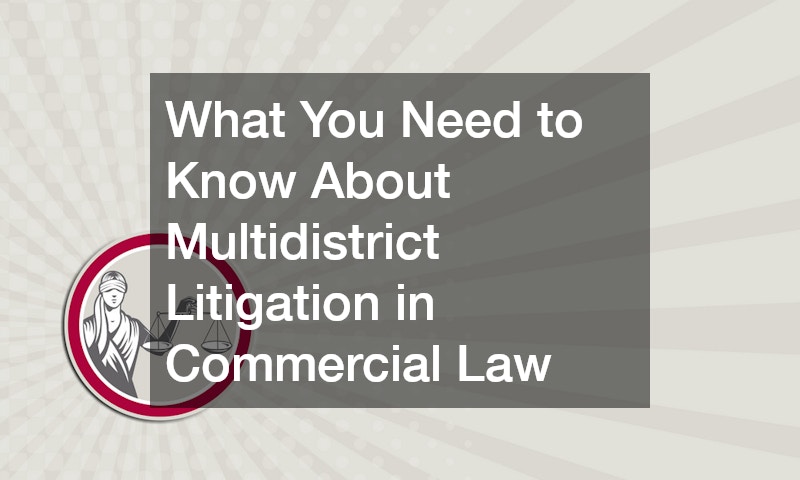
What You Need to Know About Multidistrict Litigation in Commercial Law

If you’ve heard about consolidated litigation or multidistrict litigation (MDL), you’re probably aware it’s a unique process in commercial law. This approach is designed for efficiently handling multiple similar cases when the courts get swamped with commercial disputes involving common issues. If you’re involved in a commercial dispute, knowing the basics of MDL can help you understand what’s at stake and how commercial lawyers navigate these complex terrains.
What Exactly Is Consolidated Litigation?
Consolidated litigation, or MDL, is when the court combines several related cases to be heard together. This method is typically applied in commercial litigation cases where many lawsuits share similar facts, questions of law, or parties involved. A commercial lawyer representing clients in these situations aims to streamline processes.
Why Do Courts Use Consolidated Litigation?
Imagine hundreds or thousands of similar cases flooding the courts; it can be overwhelming and inefficient. The MDL process lets a single court manage discovery, pre-trial motions, and legal issues for all related cases. This efficiency not only helps commercial lawyers save time but also aids in resolving disputes faster, benefiting both plaintiffs and defendants involved in commercial disputes.
Key Benefits of Multidistrict Litigation in Commercial Disputes
One major benefit of MDL in commercial litigation is the consistent treatment of similar issues across cases. By consolidating cases under one court, MDL promotes uniformity in legal rulings, which is particularly important in commercial disputes where fairness and predictability are highly valued. Commercial lawyers find this useful as they can focus on core legal.
How Is Consolidated Litigation Different from Class Actions?
While both MDL and class actions involve multiple parties, they are not the same. Class actions combine claims into a single lawsuit with a representative plaintiff, whereas MDL keeps cases separate but consolidated in one court for pre-trial processes. A commercial lawyer will know when MDL or a class action better serves their client’s interests.
Who Decides Whether a Case Becomes Part of MDL?
The decision to move cases to an MDL court is made by a panel of federal judges known as the Judicial Panel on Multidistrict Litigation (JPML). They review potential cases to determine if they involve common questions of fact and would benefit from consolidation. For commercial lawyers representing clients in complex litigation, the panel’s decision can be crucial in shaping the strategy for large-scale disputes.
The Role of Commercial Lawyers in MDL
In MDL, commercial lawyers play an instrumental role in managing the intricate details of consolidated litigation. They coordinate discovery, handle motions, and represent clients’ interests throughout the pre-trial phase. Their expertise in commercial litigation is critical in navigating the complexities of MDL, especially when representing clients in high-stakes commercial disputes.
MDL and Its Impact on Commercial Dispute Resolution
MDL can have a significant impact on the resolution of commercial disputes, sometimes even leading to quicker settlements. Because MDL allows for the efficient handling of evidence and testimonies, it often encourages parties to negotiate settlements earlier. For businesses entangled in commercial disputes, MDL can be a strategic path to resolve conflicts without the long haul of individual trials.
What Are the Downsides of Multidistrict Litigation?
While MDL offers many advantages, it has some downsides as well. One issue is that individual cases might not get the same level of personalized attention as they would if handled separately. Commercial lawyers need to balance the efficiency of MDL with ensuring that their clients’ unique circumstances are adequately represented in the process.
When Does MDL End, and What Comes Next?
Once the MDL court has managed pre-trial matters, it can send cases back to their original courts if they don’t settle. However, if the parties reach a resolution during MDL, the cases won’t need to return to other courts for trial. A commercial lawyer will guide their clients through this phase, aiming to achieve the most favorable outcome, whether through settlement or trial.
Should You Consider MDL for Your Commercial Dispute?
If your business is facing a large-scale commercial dispute, MDL might be worth considering. It offers a streamlined path for handling cases involving many plaintiffs or defendants with shared legal issues. Experts who are experienced in MDL, like Judge Jose Lineras, can help you evaluate if consolidated litigation is the right choice based on your case’s specific circumstances.





